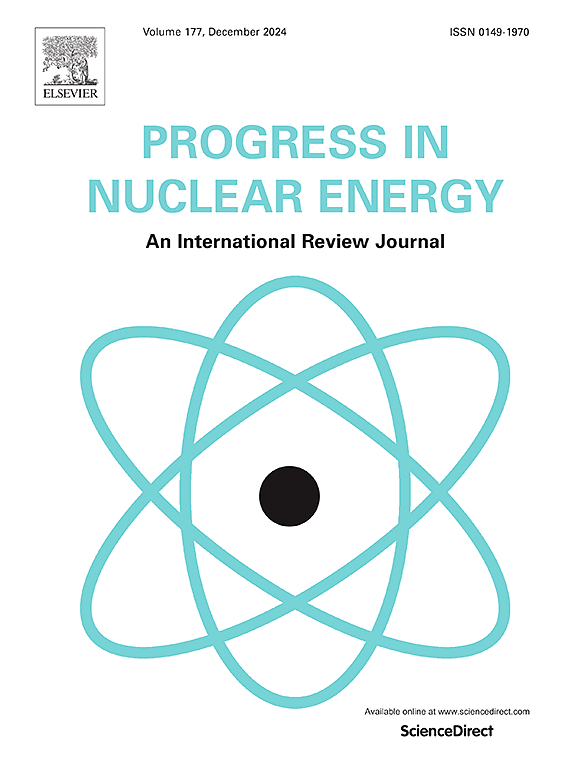Numerical assessment of in-vessel corium retention in PHWR during severe accident
IF 3.2
3区 工程技术
Q1 NUCLEAR SCIENCE & TECHNOLOGY
引用次数: 0
Abstract
Under a hypothetical design extension condition involving core melt (also called severe accident), the PHWR calandria is expected to retain core debris/melt pool and safely terminate the event. The study presents numerical investigations on in-vessel retention (IVR) of corium within the PHWR calandria for a scenario in which the entire reactor core has disassembled, relocated, and subsequently melted upon interaction with the calandria vessel. A two-phase model capable of simulating melting and solidification within the corium region is employed. The model accounts for temperature variations along the inner surface of the calandria vessel by incorporating radiative heat transfer from the corium to the vessel wall, implemented through appropriate user-defined boundary conditions. The developed model is used to analyse corium crust formation and the resulting heat flux at the outer surface of the calandria vessel. From the assessment, it is found that for PHWRs radiation heat transfer from top surface of corium plays crucial role in IVR as it reduces heat flux from corium bottom surface. Sensitivity analyses are performed to evaluate the influence of uncertainties in key input parameters on the effectiveness of in-vessel retention in the PHWR under severe accident conditions.
严重事故中PHWR容器内堆芯滞留的数值评价
在涉及堆芯熔体(也称为严重事故)的假想设计扩展条件下,PHWR压水堆有望保留堆芯碎片/熔池并安全终止事故。该研究对PHWR万向炉容器内堆芯的容器内滞留(IVR)进行了数值研究,在这种情况下,整个堆芯在与万向炉容器相互作用下被拆卸、重新安置并随后熔化。采用了一种能够模拟堆芯熔化和凝固的两相模型。该模型通过适当的用户定义的边界条件,结合从堆芯到容器壁的辐射传热,计算了沿calandria容器内表面的温度变化。所建立的模型用于分析炉芯壳的形成和炉芯壳外表面的热流密度。通过评价发现,对于PHWRs来说,堆芯顶面辐射传热在IVR中起着至关重要的作用,因为它减少了堆芯底面的热通量。通过敏感性分析,评估了在严重事故条件下,关键输入参数的不确定性对PHWR容器内滞留效果的影响。
本文章由计算机程序翻译,如有差异,请以英文原文为准。
求助全文
约1分钟内获得全文
求助全文
来源期刊

Progress in Nuclear Energy
工程技术-核科学技术
CiteScore
5.30
自引率
14.80%
发文量
331
审稿时长
3.5 months
期刊介绍:
Progress in Nuclear Energy is an international review journal covering all aspects of nuclear science and engineering. In keeping with the maturity of nuclear power, articles on safety, siting and environmental problems are encouraged, as are those associated with economics and fuel management. However, basic physics and engineering will remain an important aspect of the editorial policy. Articles published are either of a review nature or present new material in more depth. They are aimed at researchers and technically-oriented managers working in the nuclear energy field.
Please note the following:
1) PNE seeks high quality research papers which are medium to long in length. Short research papers should be submitted to the journal Annals in Nuclear Energy.
2) PNE reserves the right to reject papers which are based solely on routine application of computer codes used to produce reactor designs or explain existing reactor phenomena. Such papers, although worthy, are best left as laboratory reports whereas Progress in Nuclear Energy seeks papers of originality, which are archival in nature, in the fields of mathematical and experimental nuclear technology, including fission, fusion (blanket physics, radiation damage), safety, materials aspects, economics, etc.
3) Review papers, which may occasionally be invited, are particularly sought by the journal in these fields.
 求助内容:
求助内容: 应助结果提醒方式:
应助结果提醒方式:


